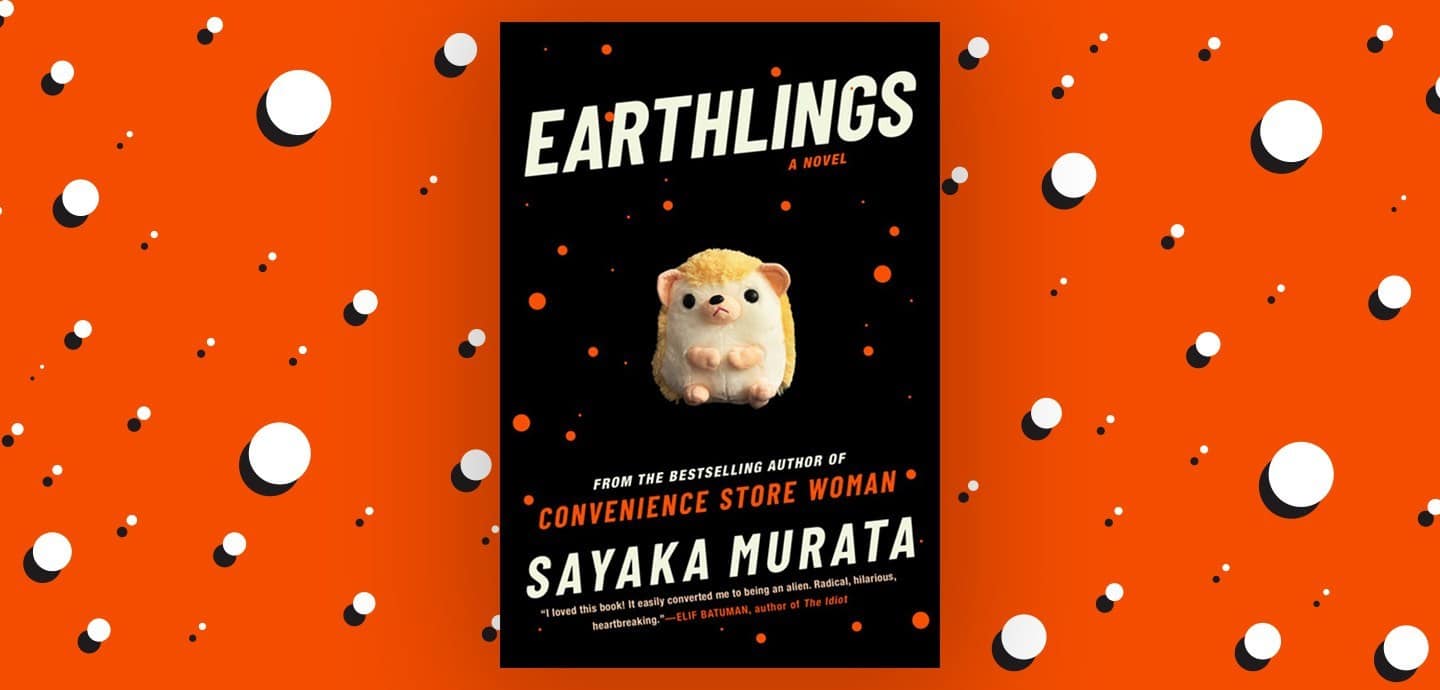ELLA KELLEHER WRITES (in the second of three reviews of new Japanese books) – As you read this thoroughly entertaining yet gruesome tale, you will wonder, is this narrator mentally ill? Or does the problem lie in an evil society where humans are reduced to being baby-making, money-making cogs in the machine? Instead of giving a clear answer to these questions, author Sayaka Murata decides to experiment and let these questions launch the rest of her story.

Earthlings (2020) is the fourth novel by Japanese writer, Sayaka Murata, that has been brilliantly translated into English by Ginny Takemori. Murata’s first hit was Convivence Store Woman, which dazzled the literary world in 2018. Murata’s most recent hit, Earthlings, tackles the idea of conformity and alienation in a world of suffocating uniformity.
Two young cousins, Natsuki and Yuu, meet during annual family gatherings in the mountains outside of Tokyo. The two children agree that they are aliens, abandoned on Earth among humanity. Natsuki, the narrator, has a plush hedgehog toy who comes from “Planet Popinpobopia,” and assures Natsuki that she has magical powers that humans do not possess. When Yuu confesses that he also comes from the same planet as Natsuki’s toy, they rejoice in their shared differences. The two nine-year-olds decide to make a marriage pact in secret: “1) Don’t hold hands with anyone else. 2) Wear your ring when you go to sleep. 3) Survive, whatever it takes.” This last rule reverberates throughout the novel like seismic shockwaves.
What begins as a sweet and playful game among children is fairly standard and imaginary until, back at home in Tokyo, Natsuki is sexually assaulted by her male schoolteacher. During the next family gathering, both Natsuki and Yuu decide to have consensual sex and get caught and severally punished by the adults who stumbled upon them mid-act. As punishment, Natsuki is never again allowed to visit Yuu and is forced to live a heavily sheltered adolescent life.
As Natsuki grows up, she alienates herself more from Japanese society. She continues to console herself with the childish belief of having otherworldly origins. To escape the pressure of her cruel mother and spoiled sister, Natsuki enters into a completely loveless and empty contractual marriage with a man named Tomoya. Both Natsuki and Tomoya agree that society is a “Baby Factory” which they are expected to be loyal to. In defiance against the “Factory”, the two of them decide to deny their sexuality and earthly reality together.
Natsuki and Tomoya decide to visit Yuu in the remote mountain house where their childhood mistake took place. The duo becomes a trio when Yuu joins his guests and admits he still believes he is from “Planet Popinpobopia.” Tomoya then decides he must violate a major “human taboo” in order to be fully “alien.” Tomoya settles on committing the act of incest, stating, “I’m going to go to my parents’ place this weekend. I will have sex with someone in my family before coming back here.” In further rejection of societal norms, Natsuki and Yuu do not try to stop him.
As predicted, Tomoya’s mission does not go well and ends with a severe beating by his father who forces Tomoya and Natsuki temporarily back to Tokyo for an “interrogation.” However, upon the return of Natsuki and Tomoya to the mountain house, the most outrageous acts of psychopathy and disillusionment are yet to come.
The tone of Murata’s writing is a mixture between emotionless and downright puerile. Even in the scenes of extreme violence or sexual assault, the voice of the narrator has an affectless quality, which the reader can only assume is a result from Natsuki’s PTSD from her sexual assault (and her alien origins). The description given to “The Factory” (i.e., society as a whole) sounds artificial and robotic because Natsuki gazes at it from an outside and apathetic point-of-view. The overall tone is that of flatness, a distance is put between the narrator and her subjects. This is Murata’s trademark style and something that the translator expertly conveyed.
The end goal of the trio is to perfect their detachment from society, and so as an act of further rebellion, they attempt to reject all norms and strictures. At first this revolt is anticlimactic. The three characters steal food from neighboring homes as they create a safe space inside the mountain home of Natsuki’s relatives. Suddenly, this fight against society takes a horrific turn and makes the reader question whether the novel belongs in the horror genre or not.
While reading the ending, the reader must confront the reality of dehumanization in this well-paced and strange tale about societal rejection. Being an alien in Earthlings is simply code for being alienated in society – something many readers can relate to. The main three characters rejoice not in what they are, but rather in what they are not: human/breeding machines for the “Baby Factory.” We, the reader, are left wondering how much of a no-return slippery slope non-conformity truly is … or whether it is the only sane option in life.

